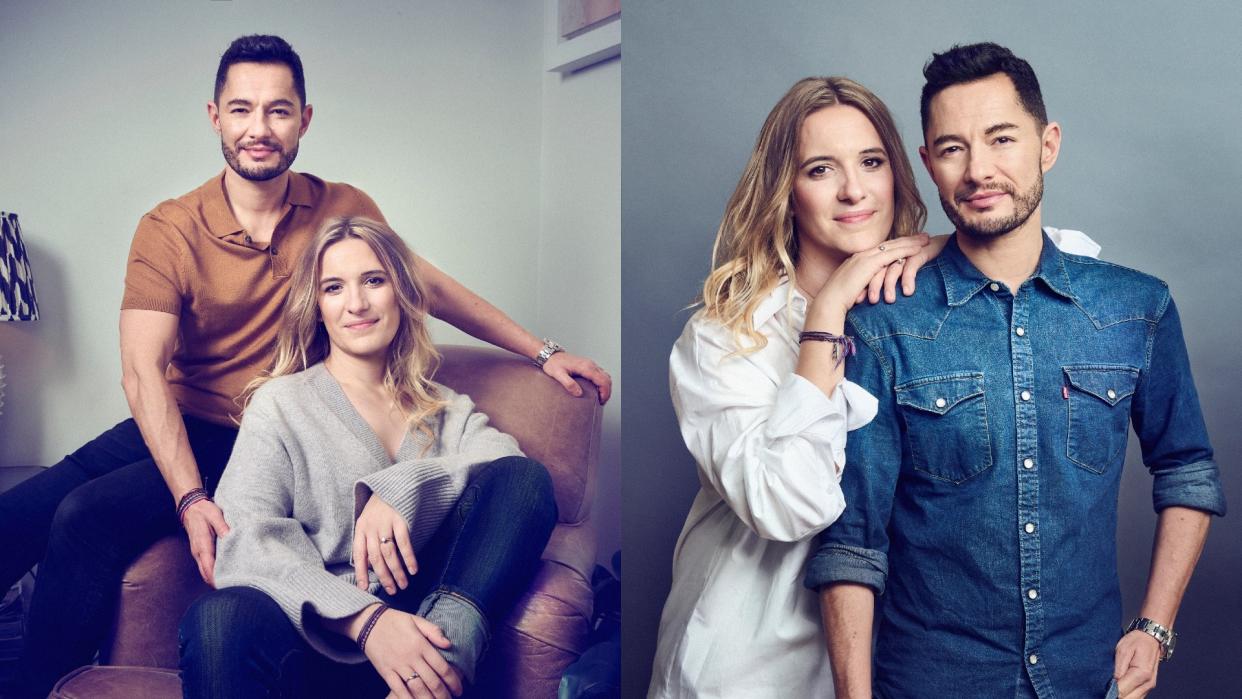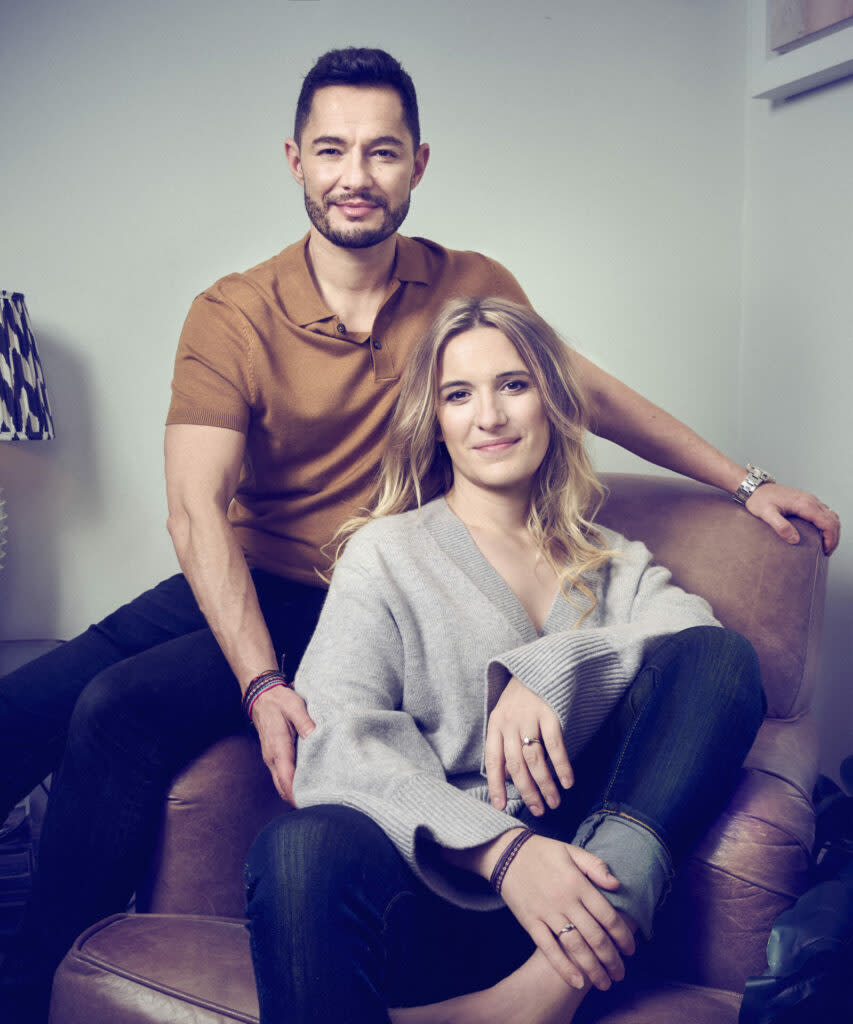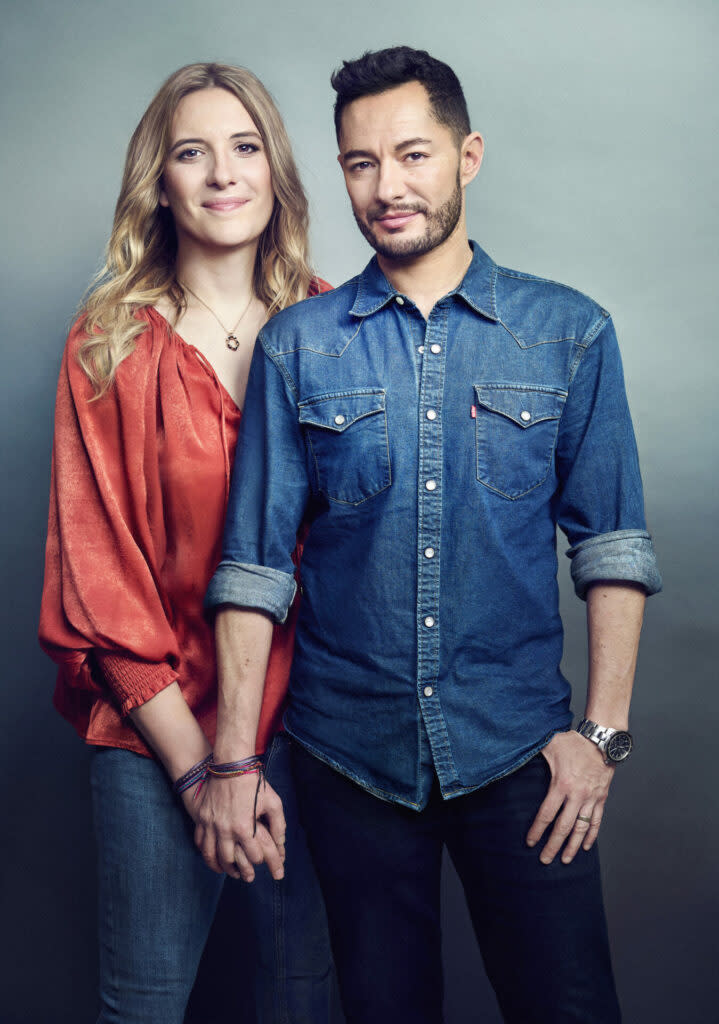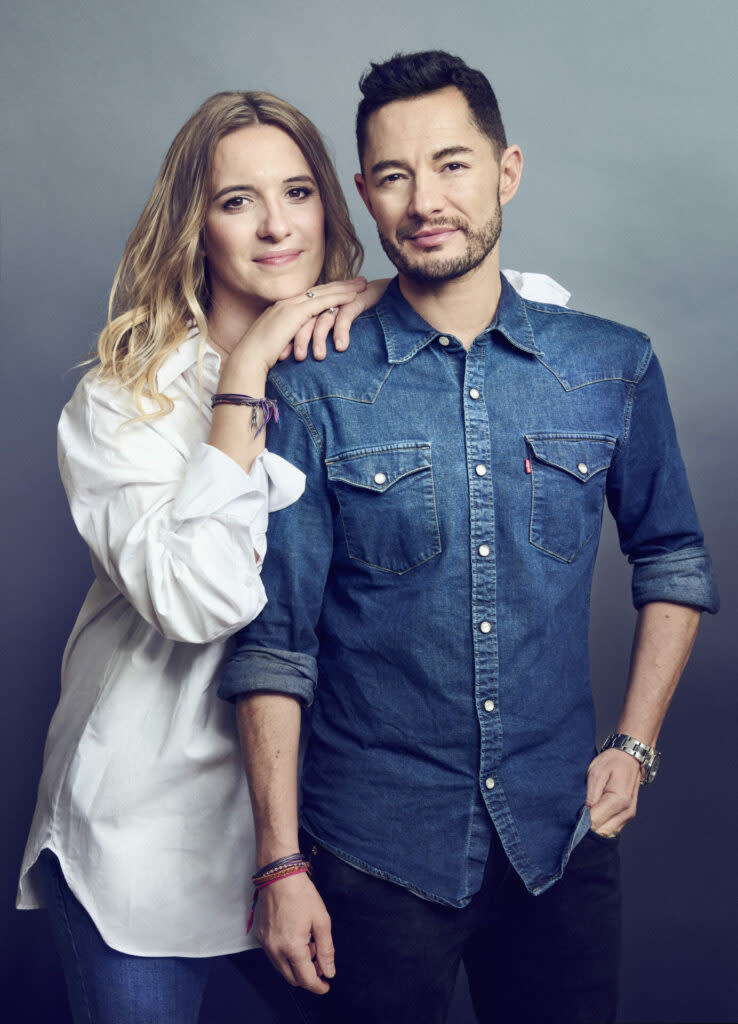Jake and Hannah Graf interview: ‘It’s hard to imagine life without the love and joy we have as a family’

Days before our interview with Jake and Hannah Graf, two of the country’s most recognisable parents, Attitude attends a two-year-old’s birthday party and saves several unsteady-on-their-feet toddlers from grave injuries. (They would’ve bounced back swiftly, no doubt. But we like to feel heroic.)
The organised chaos of the party proves useful: it gives us timely insight into the world of new parents. Jake and Hannah, married since 2018, are very much at that stage with Millie, three, and Teddie, one. Certainly, the day prior makes Attitude more thankful to the pair for finding the time to chat.

“We’re tired, but really, really happy, ” laughs Jake over Zoom, minutes after the children’s bedtime. “Kids are exhausting, obviously!”
They have a quiet-ish six weeks ahead, at least. “We like a close family Christmas – we’re not ones for big extravagant parties,” explains Hannah. “We’re looking forward to being holed up and cosy with the kids. We’re doing Kew Christmas lights, which Millie enjoys!”
“It sounds so boring!” laughs Jake, palpably excited. “My Christmases have been rocky in the past. Now we’ve got kids… Millie’s so excited! She saw a brightly lit traffic cone and said: ‘Christmas lights!’ We’re visiting Hannah’s parents for a few days, but mostly we’ll be here.”
Jake and Hannah’s lives were busy before parenthood. Hannah’s a decorated former British Army officer who served as captain in the Royal Electrical and Mechanical Engineers, becoming the Forces’ highest-ranking publicly transgender officer. She was also the Army’s Transgender Representative from 2013, before leaving in 2019. Jake, meanwhile, is a director, writer and actor, with film credits including Colette and The Danish Girl, and is a judge for the National Diversity Awards. Earlier this year, both added ‘memoirist’ to their CVs with the release of Becoming Us. Two years ago, they starred in Channel 4 documentary Our Baby: A Modern Miracle.
“We worked so hard to have our kids,” shares Jake. “It wasn’t even just the financial question. It was the emotional journey. For me, having eggs harvested – quite a horrible procedure for a trans man – and having to stop testosterone, operations, injections, all sorts of awful things. But I never imagined I’d be a dad. Six years into transitioning I thought, why not? I was comfortable with the man I knew myself to be. And every day I look at those kids and think: ‘My god, I’m so grateful.'”
“Jake asked me if I was up for kids on our very first phone call!” – Hannah Graf
Hannah hadn’t always imagined having kids, either. “When I transitioned, I assumed I was going to be alone for the rest of my life,” she shares. “When you’ve grown up with transphobia from every angle of society, for decades, it’s impossible not to take some of that in and internalise it. So, I just thought no one would ever love me as a trans person. I signed up to that. Three years into my transition, after bumping into Jake and starting dating, my world unfolded, showing me possibilities I didn’t even know were there. Jake asked me if I was up for kids on our very first phone call!”

Jake and Hannah previously shared they’re not raising their kids gender-neutral, but are bringing them up “to be as open as possible,” says Hannah. “It’s what we stand for. We do that by talking to them about people, introducing them to diverse families, reading the books. But they still live in the world, society. Even in metropolitan London, Millie comes home from nursery saying: ‘Girls have long hair!’ It’s like… argh!”
“‘Girls are princesses! Boys like trucks!'” chimes in Jake. “Who’s teaching this nonsense?!”
“Kids spend so much time in educational environments, soaking up learning,” continues Hannah, calling LGBTQIA+-inclusive education “vital. They must learn and understand difference from day dot. That doesn’t mean it can’t be age-appropriate, or that you have to explain every intricacy at a young age.”
“It feels like the liberties, inclusion, and acceptance we’ve built up over 40 years has been eroded” – Jake
“We’re patrons of Mermaids,” adds Jake of the charity supporting gender variant and transgender youth. “We’re aware of what the government is trying to do in schools. They’re talking about laws that would veto a young trans person’s right to transition at school if it’s affecting the mental health of their peers. All of these suggestions, which I think have been blocked recently by the General Attorney, hark back to Section 28.”

If an effective Section 29 were brought in, again outlawing discussion of LGBTQIA+ issues in the education system and local authorities, as in Florida and Russia, would the Grafs consider home-schooling? Hannah calls it “the wrong answer. The answer is to fix the issue.” Adds Jake: “That’s quite an ask, having the kids home every day! And they’d lose out on socialisation; all the good things. Also, speaking to people in the education sector, just as people in the NHS, there are a lot of good people at ground level who will not implement archaic, unkind and totally exclusionary laws, who will not see trans kids excluded or made to feel unsafe.”
“I cannot wait for this government to be out,” he adds of the Conservatives. “It feels like all the liberties, inclusion, and acceptance we’ve built up over 40 years has been eroded. We’ve slipped from number one on IGLA Europe’s diversity and inclusion list to 17! The young trans and non-binary people we work with are concerned. And as we all know, it starts with trans, and goes on to the rest of the LGB community.”
Opines Hannah: “A lot of things the government have said, I’m sure is because they think [this is] a wedge issue. They’ve polled their base to understand how they felt about trans issues, and know a lot of people who vote Tory won’t support trans rights in general. By creating these wedge issues and keeping them in the public consciousness, they can campaign in the future.”
As many reading this will know from their own childhoods, despite the thousands of transphobic articles littering mainstream press every year (“there’s no counter, no balance,” observes Jake), LGBTQIA+ kids exist. What advice would the Grafs offer to parents of a queer child? “Unconditional love,” says Hannah.
“We’re asked this pretty much every talk we give,” says Jake. “‘Listen’ would be top. Listen and respect. There’s this concern of: ‘Is it a trend? Because they’ve been influenced? What if they change their mind?’ This nonsense rhetoric of: ‘Children don’t know what they want for breakfast… How can they know what gender is?’ This comes from fear from parents.
“The narrative in the British media – largely negative, telling parents they shouldn’t be supporting trans kids, that they’re falling for this fad – of course parents are concerned. But we always tell them – and we’re seeing more and more parents of trans and gender nonconforming kids when we do these talks – just listen. If they’re telling you from a young age they feel a certain way, are unhappy with their pronouns, or their name, listen. Even if they change their name in two, five, or 10 years, you’ve been the supportive parent that let them wear certain clothes, maybe just in the house, to make them feel more comfortable at that time. You’ve lost nothing.”
“I grew up in a very conservative household in the 80s,” he furthermore adds. “No one was taking about trans [issues]. My parents didn’t have the knowledge, understanding, resources. No internet, nothing. My childhood was blighted by that. As a result I fell into alcoholism and drug abuse at 16. I would say to any parent: listen.”
Many LGBTQ people would make great parents, Attitude observes, but feel the idea of starting a family is somehow out of reach. Meanwhile, a lot of straight, cisgender people act as if it’s their entitlement – regardless of their qualification for the role.
“It’s hard to imagine a life without the kids – without the love and joy we have as a family,” Hannah says. “It’s a real reminder that many LGBTQ+ people out there still feel families, relationships, let alone kids are not for them, when that sometimes simply isn’t the case. We need to find a way to unpick that.”
Becoming Us by Jake and Hannah Graf (Coronet, £22) is out now.
The post Jake and Hannah Graf interview: ‘It’s hard to imagine life without the love and joy we have as a family’ appeared first on Attitude.


